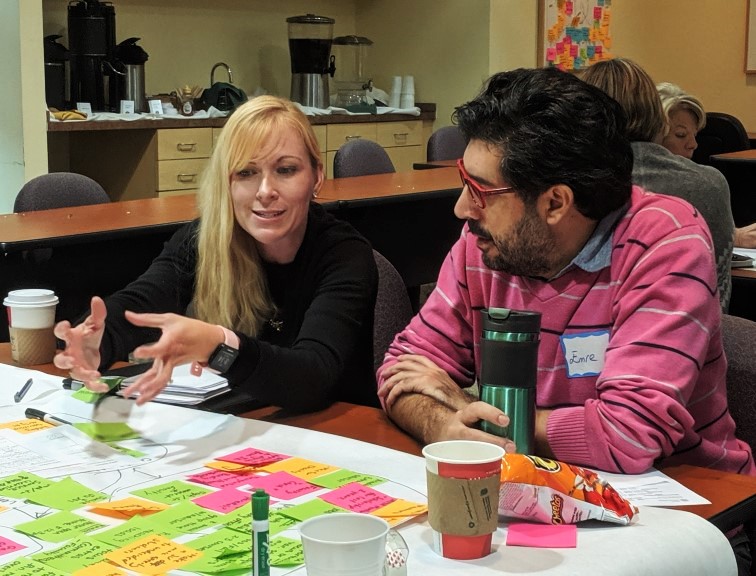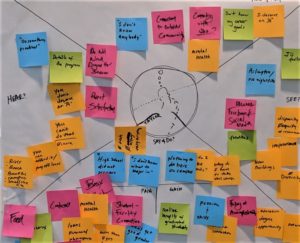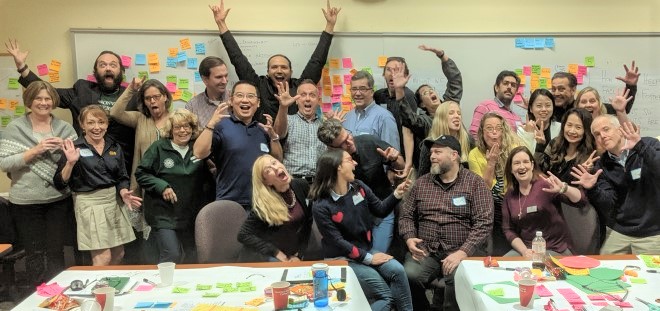STEAM.
That’s what you get when you bring together faculty from multiple disciplines, backgrounds and experience levels and present them with a different way to examine a problem in search of a solution.
And at Jacksonville University, STEAM is poised to power the future of our students’ educational experience.
“This is all about combining disciplines and finding common concepts that can be applied collaboratively to solve problems,” says Assistant Professor of Mechanical Engineering Emre Selvi, who was one of approximately 30 participants in last week’s Design Thinking Workshop.

The workshop, which was funded by a grant from the Jessi Ball DuPont Fund, offered future instructors in Jacksonville University’s new STEAM (Science, Technology, Engineering, Arts and Mathematics) Institute an alternative approach to teaching. Emphasizing critical thinking and creative problem-solving, the Design Thinking approach encourages risk-taking and creativity by intentionally encouraging people with different perspectives, knowledge, skills and experience from multiple specialty areas to work together to create a practical solution for a real-world problem. The process is often used today in the arts, engineering, the corporate world, and social and civic spaces.
The University selected Design Thinking to help faculty transition to a new approach to teaching and course development for the STEAM initiative. The STEAM initiative aims to teach our students to learn “in the moment” using new technologies such as augmented reality and virtual reality and creatively gain new knowledge to tackle real-world problems, according to Renee Rossi, Director of Research & Sponsored Programs, who helped bring the workshop to the University.
One of the more important activities in finding solutions is understanding the problem and empathizing with the people experiencing it, according to Ken Baldauf, Director of Florida State University’s Innovation Hub, who facilitated the session at Jacksonville University.
During the workshop, attendees learned techniques such as affinity mapping, an exercise using Post-It notes to help members of a group share and group thoughts and insights to arrive at a common understanding of a problem.

“In many of my sociology courses, we already develop and carry out projects that address social issues. The affinity maps will be an engaging way to enhance the project ideation,” said Assistant Professor of Sociology Laura Atkins, who also attended the workshop. “Now, I just need to get a stockpile of Post-It notes for affinity maps!”
The University plans to use a three-tiered professional development platform, including train-the-trainer sessions, peer coaching, and incentives for testing the Design Thinking knowledge prior to implementing in fall 2020 in the STEAM initiative.
The University also plans to open its new STEAM Institute in 2020 under the direction of Dr. Murat Tiryakioglu in a soon-to-be renovated 30,000 sq. ft. building on the University’s main quad.
The focal point of the Institute will be a Student Design Center equipped with a variety of traditional and novel manufacturing processes, as well as the latest classroom technologies, dedicated maker space, and ample active learning space. The facility will include lab-based technology for undergraduate and graduate research projects in engineering, robotics, process control, artificial intelligence, thermodynamics, power systems and the theory of machines.
With access to the latest technical resources, students will learn about research and development by solving problems and building prototypes for real-world industry clients, which will also increase the University’s intellectual property opportunities.
The Institute will also serve as a convergence point for students and faculty to meet with industry partners, especially smaller start-up companies who may have vision but lack the personnel and instrumentation to turn ideas into products.
 Wave Magazine Online Jacksonville University News Hub
Wave Magazine Online Jacksonville University News Hub
